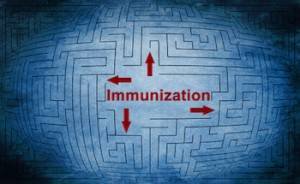
In 1999, a study was published in the Lancet suggesting that autism is related to the MMR (measles, mumps, and rubella) vaccine. Media reporting on this led to widespread public concern and a decrease in the use of the MMR vaccines.
It turns out the link between the MMR vaccine and Autism Spectrum Disorders (ASD) was never found to be true. The Lancet published a retraction and the author of the original article was found guilty of professional misconduct.
Since then several additional studies have been published showing no relationship between the use of vaccines and Autism Spectrum Disorders. (CDC)
Why the Increase in Autism Spectrum Disorders?
According to the Center for Disease Control, 1 in 88 children in the United States is diagnosed with an Autism Spectrum Disorder. This is an increase of 30% in the past two years. Researchers believe that the rise in diagnoses is due to better diagnostic tools, allowing for more precise diagnosis than in previous years. In addition, many professionals are more educated about ASD in recent years than they were previously leading to more diagnosis.
The fact remains that many people continue to believe vaccines play a role in the development of Autism Spectrum Disorders.
Beliefs About Vaccines and Autism Spectrum Disorders
Why the persistence in linking vaccines to Autism Spectrum Disorders? For one thing, since ASD begin very early in life it’s hard to see how the environment could be a cause. In turn, it’s much easier to imagine a chemical and/or biological process being the primary agent. In addition, parents are bombarded with information from numerous credible sounding sources about the origins of ASD and the idea that vaccines is the culprit is hard to resist. The concepts around scientific testing are difficult to understand, making it tough to separate good science from bad. Finally, until scientists can prove exactly what causes autism, it’s difficult to definitively disprove anything.
Is the Misconception About Vaccines Really Persistent?
In spite of the widespread evidence for lack of a connection between vaccines and Autism Spectrum Disorders, the belief in that connection persists. One study found that about 27% of families who had at least one child with autism spectrum disorder delayed vaccinations for the other children. Another study found that half of all parents stopped or altered vaccinations based on the belief that the vaccinations contributed to Autism Spectrum Disorder.
It seems that a big reason for this is a barrier that often develops between parents and medical professionals. Many parents who choose not to vaccinate don’t trust their doctors. On the other hand, physicians often believe that parents of children with ASD are not open to discussions about vaccinations or that education won’t cause them to change their beliefs.
Parents of children with Autism Spectrum Disorder often feel very guilty about the idea that in vaccinating a child they may have caused their child’s disorder. They sometimes decline vaccines because they may be concerned they can make their child’s autism worse cause autism and their other children.
These are several of the reasons why vaccines have been linked to autism spectrum disorder. There may be other factors involved but the most important thing to remember is that there is no solid evidence of a relationship between autism spectrum disorder and vaccinations. The benefits of vaccines for children far outweigh the risks they bring.
